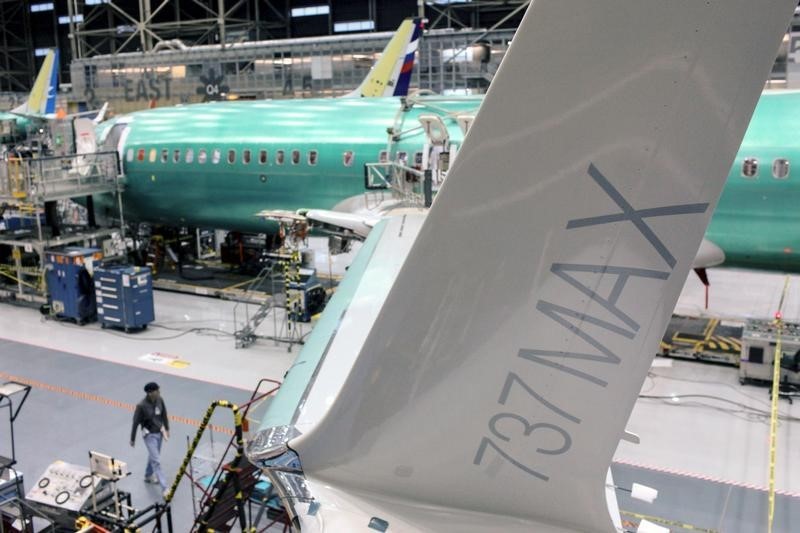This post was originally published on this site
https://i-invdn-com.akamaized.net/news/LYNXNPEC0O18V_L.jpg
Investing.com — Boeing (NYSE:BA) has had a dreadful year in 2020, as the COVID-19 pandemic worsened the outlook for the aerospace giant after the March 2019 grounding of its 737 Max jet. But shares climbed around 25% in June, cutting back steep losses for the year amid signs that the worst may be over.
Geoffrey Smith argues the bull case for Boeing which revolves around the growth outlook for commercial aviation. Liz Moyer counters that fundamentals don’t bode well for the company’s outlook. This is Point/Counterpoint.
The bull case
The very long-term bull case revolves around the question of whether the company’s management is right on its call that the Covid pandemic will not, ultimately, end the secular growth in commercial aviation.
“The fundamentals that have driven air travel for the past five decades and doubled air traffic over the past two decades remain intact,” Boeing’s new CEO David Calhoun said on the company’s last earnings call. “We believe this industry will recover but it will take two to three years for travel to return to 2019 levels and it will be a few years beyond that for the industry to return to long-term growth trends.”
The reasonable assumption that Calhoun and his team understand their own business still leaves you a three-year fallow period in which you can probably expect better returns elsewhere with your money, but does not mean Boeing is destined to long-term decline like a department store or a shopping mall owner. Wide-bodied aircraft and servicing attack helicopters are not businesses that are crying out for disruption. Aerospace is still a good business to be in for the long haul.
That’s particularly true given that nearly half of Boeing’s business comes from defense and space. The Starliner capsule charge is likely to be merely a short-term embarrassment, and in any case only a rounding error compared to the 737 MAX problems. Together, the defense and global services businesses have order backlogs of some $87 billion, which they can reasonably expect to process at an operating margin well over 10%.
Investors can have legitimate concerns about Boeing’s debt, and its long-term trajectory will remain unclear there is clarity on its compensation liabilities to airlines and on their willingness to stick with past orders. That’s a question that will take a couple of years to answer. But the existential risk of insolvency is as good as ruled out by its strategic importance, both as a keystone employer, and as a key defense contractor. The Federal Reserve’s program for buying corporate debt is expressly tailored to keeping the borrowing costs of such companies under control. The company has taken a hell of a hit, but there’s life in the old dog yet.
The bear case
To make the bear case on Boeing, look no further than the fundamentals.
Revenue has fallen sharply since the beginning of 2019, accelerating after the grounding of Boeing’s 737 MAX jets and the globe-straddling Covid-19 virus that has seriously interrupted international and domestic air travel. First quarter revenue was down 26% over last year. Full-year 2019 revenue fell 25%.
Boeing recorded a loss of $1.70 a share in the first quarter, citing the effects of Covid-19 and the 737 MAX issues. Free cash flow was a negative $4.7 billion.
In the year earlier period, EPS was $3.16 and revenue was $16.9 billion. Right now, the consensus of analysts tracked by Briefing.com says second quarter will be a loss of $2.17 a share on revenue of $14.3 billion.
The company’s commercial airplane division saw revenue plummet 48% in the first quarter, and deliveries of aircraft cut by two-thirds. As a result Boeing has had to slow down production. Its 787 plane production will fall to 10 a month this year from 14 and gradually shrink to 7 a month in 2022. Its 777 production will be three a month next year.
This comes as airlines from all over the world have canceled orders or delayed delivery. Late last month, the airplane leasing company BOC Aviation canceled an order for 30 737 MAX planes, and Norwegian Air Shuttle scuttled plans to buy 92 737 MAX jets and five 787 Dreamliners.
Some airlines are suing Boeing to recoup money they paid in advance for orders they have since canceled.
And it’s not just passenger aircraft that is vexing the company. In its space business, Boeing’s Starliner capsule has been having issues, forcing the company to take a $410 million charge in the fourth quarter in case it has to redo a test flight after failing to reach the correct orbit to dock with the International Space Station.
Boeing suspended its dividend in March and put a pause on share buybacks indefinitely. Its CEO will forgo pay.
A v-shaped recovery – both in economic terms and in terms of virus mitigation – would help Boeing, especially if air travel returned to somewhat normal. But spikes in Covid-19 cases around the world, forcing the reversal of business reopening efforts, don’t bode well for Boeing’s near-term.

